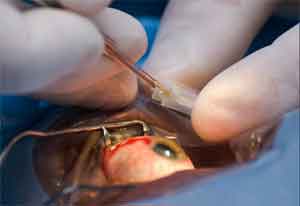- Home
- Editorial
- News
- Practice Guidelines
- Anesthesiology Guidelines
- Cancer Guidelines
- Cardiac Sciences Guidelines
- Critical Care Guidelines
- Dentistry Guidelines
- Dermatology Guidelines
- Diabetes and Endo Guidelines
- Diagnostics Guidelines
- ENT Guidelines
- Featured Practice Guidelines
- Gastroenterology Guidelines
- Geriatrics Guidelines
- Medicine Guidelines
- Nephrology Guidelines
- Neurosciences Guidelines
- Obs and Gynae Guidelines
- Ophthalmology Guidelines
- Orthopaedics Guidelines
- Paediatrics Guidelines
- Psychiatry Guidelines
- Pulmonology Guidelines
- Radiology Guidelines
- Surgery Guidelines
- Urology Guidelines
Oral sedation satisfactory for patients undergoing cataract surgery

USA: During cataract surgery, the use of oral sedation is non-inferior to intravenous (IV) sedative in terms of patient satisfaction, according to a recent study published in the journal Ophthalmology.
"The use of oral sedation in cataract surgery has been suggested as a cost- and space-saving measure, potentially allowing the transition of some cases from an operating to the procedure room or office-based setting," write the authors.
Crandall E. Peeler, from Boston Medical Center, and colleagues, conducted the study to determine whether patient satisfaction with oral sedation is non-inferior to intravenous (IV) sedation for cataract surgery.
For the purpose, the researchers assigned 85 patients (mean age, 65.8 years) scheduled for cataract surgery to receive either oral triazolam with IV placebo or IV midazolam with oral placebo preoperatively.
The primary outcome was patient satisfaction, measured by a survey administered on postoperative day 1. Secondary outcomes included surgeon and anesthesia provider satisfaction, need for supplemental anesthesia, and surgical complications.
Also Read: Preoperative testing does not increase safety in cataract surgery
Key findings of the study include:
- Among the 85 patients completing the study, the mean patient satisfaction score was 5.34 ± 0.63 (range 3.75 to 6) in the oral sedation group and 5.40 ± 0.52 (range 4 to 6) in the IV group.
- With an a priori non-inferiority margin of 0.5 and a difference in mean scores between the two groups of 0.06, the results demonstrate non-inferiority of oral sedation with a p-value of 0.0004.
- Surgeon and anesthesia provider satisfaction was similar between the two groups.
- Intraoperative complications occurred in 16.7% in the oral group and 9.3% in the IV group.
- The only major intraoperative complication – a posterior capsular tear – occurred in the IV group.
- Eight patients in the oral group (19.0%) and 3 in the IV group (7.0%) received supplemental IV sedation.
Also Read: Preop OCT Screening improves cataract surgery outcomes
Based on the study, the authors reported the non-inferiority of oral compared with IV sedation for cataract surgery in a diverse patient population in terms of patient satisfaction.
For detailed study log on to https://doi.org/10.1016/j.ophtha.2019.04.022

Disclaimer: This site is primarily intended for healthcare professionals. Any content/information on this website does not replace the advice of medical and/or health professionals and should not be construed as medical/diagnostic advice/endorsement or prescription. Use of this site is subject to our terms of use, privacy policy, advertisement policy. © 2020 Minerva Medical Treatment Pvt Ltd